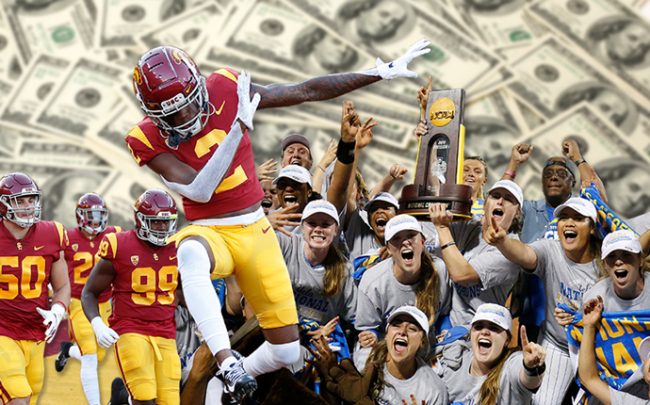
The Bill
In early June, Florida Governor Ron DeSantis revolutionized college football by signing the NIL bill to pay college players.
The state of Florida became the very first to sign the new NIL bill and also put it into effect. This new NIL bill will allow college athletes to prosper off their name and likeness. Players can now make money from thing such as jersey sales and other avenues by their university.
Earlier in the year, California became the first to implement the bill but it will not go into effect until 2023. DeSantis’ new bill will become effective on July 1, 2021.
This now allows the state of Florida to pave a new path for athletes in college. It also will put the pressure on the NCAA to figure how an athlete should receive financially compensation past the classroom.
The NCAA brings in close to $1 billion in revenue during a college season every year. While college merchandise sales themselves, rack up almost $4.6 billion every year; most of these coming from jerseys and athletic wear.
Players do not see any part of this revenue that is reaching these heights because of their work and performance on the field. The new bill will ultimately allow these players to see more of a chance to earn money.
What does this mean for College sports?
Now, this does mean college athletes can now start earning money for playing their sport. However, it does not mean we will see millions of dollars passing through an individual athletes hand.
This, will in no part, make college sports become like a professional league such as the NFL, NBA, or MLB. Players will only profit off of how well their name or image impacts the school. They pay will not come directly from the school, but they will make their money from other sources. Some avenues of payment might be jersey sales, contribution to a teams success (carrying to a playoff berth), ticket sales, and more.
However, this new bill will create a monument for change throughout the college atmosphere. This bill does not only posses the ability to allow college football players to make money, but also all athletic programs to make money.
College sports will now push into change for the years to come because of the new NIL bill. Florida starts a change that sports culture will have to become acclimated too.
Why does the bill come now?
The NIL bill has been long coming for players to be paid from their name and image. Universities and Programs make millions of dollars off of their players performance each year. Money is made off of college athletes by jersey revenue, video games, ticket sales, TV viewership, and more.
However, video games are a big reason for the push for the bill; definitely since fans have been asking for a resurgence of the NCAA video games.
EA Sports in the past decade stopped producing their most prolific game ‘NCAA Football’ which left fans in disarray. The reasoning behind this came from the push from athletes wanting the money the game made from using their name.
One major incident came in the year of 2009 from Ed O’Bannon, who is a former UCLA basketball player from the 1995 national championship team. O’Bannon mentioned he played the 2009 NCAA basketball game in which he saw a replica of himself. The game shows a person of the same stature, race, mechanics, and jersey number of O’Bannon, but not his name.
The trial was set through the month of June in 2014, while the verdict came at the in the month of Aug. The judge ruling that O’Bannon was in the right along with many former athletes that video games should not market players without pay.
After O’Bannon in 2009, Arizona State Quarterback Sam Keller and Rutgers Quarterback Ryan Hart filed their own lawsuits. The plaintiffs won the case and received $20 million from the trial.
This led to the stoppage of the NCAA video games in all capacities. Football, basketball, and other sport games were cancelled by EA Sports after the lawsuit. It has been close to six years since EA Sports produced their last college sports video game.
What could happen next?
Now, with Florida passing the bill, this could lead to a multitude of states to follow. Thus, putting pressure onto the NCAA to apply the pay-for-play act to stay relevant.
There also could be the resurgence of the highly touted video games that EA Sports once produced. However, it might not be right away; states such as California are not implementing their bill until 2023. More states could follow suit with California and now Florida, but it could be years before it happens.
The EA Sports game ‘NCAA Football’ will not be back until all players can be paid. So, fans should not be too excited just yet that these bills are being passed.
Players will finally get the chance to be paid for their name and likeness, which allows a chance for EA Sports to start productions once more. More states have to follow suit before any more traction can be made.
California and Florida has revolutionized the college sports world as fans know it. This will become more than a chance for EA Sports, but for players to finally find a way to make the money that universities profit from their names.
The NIL bill will ultimately change the way the NCAA handles money distribution and players will finally see the change.




